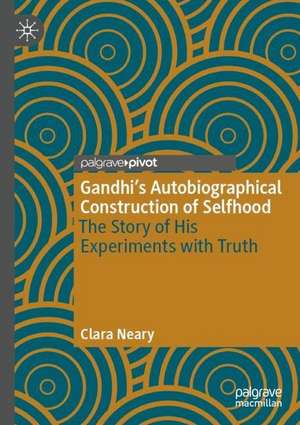Gandhi’s Autobiographical Construction of Selfhood: The Story of His Experiments with Truth
Autor Clara Nearyen Limba Engleză Hardback – 16 mar 2023
This book addresses the topics of autobiography, self-representation and status as a writer in Mahatma Gandhi's autobiographical work The Story of My Experiments with Truth (1927, 1929). Gandhi remains an elusive figure, despite the volumes of literature written on him in the seven decades since his assassination. Scholars and biographers alike agree that “no work on his life has portrayed him in totality” (Desai, 2009), and, although “arguably the most popular figure of the first half of the twentieth century” and “one of the most eminent luminaries of our time,” Gandhi the individual remains “as much an enigma as a person of endless fascination” (Murrell, 2008). Yet there has been relatively little scholarly engagement with Gandhi’s autobiography, and published output has largely been concerned with mining the text for its biographical details, with little concern for how Gandhi represents himself. The author addresses this gap in the literature, while also considering Gandhi as a writer. This book provides a close reading of the linguistic structure of the text with particular focus upon Gandhi’s self-representation, drawing on a cognitive stylistic framework for analysing linguistic representations of selfhood (Emmott 2002). It will be of interest to stylisticians, cognitive linguists, discourse analysts, and scholars in related fields such as Indian literature and postcolonial studies.
Preț: 349.91 lei
Nou
Puncte Express: 525
Preț estimativ în valută:
66.96€ • 69.82$ • 55.65£
66.96€ • 69.82$ • 55.65£
Carte tipărită la comandă
Livrare economică 20 martie-03 aprilie
Preluare comenzi: 021 569.72.76
Specificații
ISBN-13: 9783031227851
ISBN-10: 3031227859
Ilustrații: IX, 112 p.
Dimensiuni: 148 x 210 mm
Greutate: 0.3 kg
Ediția:1st ed. 2023
Editura: Springer International Publishing
Colecția Palgrave Macmillan
Locul publicării:Cham, Switzerland
ISBN-10: 3031227859
Ilustrații: IX, 112 p.
Dimensiuni: 148 x 210 mm
Greutate: 0.3 kg
Ediția:1st ed. 2023
Editura: Springer International Publishing
Colecția Palgrave Macmillan
Locul publicării:Cham, Switzerland
Cuprins
Chapter 1: “In a word, I could not live both after the flesh and the spirit” .- Chapter 2: The Story of Gandhi’s Experiments with Truth.- Chapter 3: Gandhi and the Emergence of Autobiography in India.- Chapter 4: Gandhi the Writer.- Chapter 5: Gandhi writing Gandhi: autobiographical ‘split selves’.- Chapter 6: “Life is one indivisible whole”
Notă biografică
Clara Neary is Lecturer in Stylistics in the School of Arts, English and Languages at Queen’s University Belfast, UK. She has published on a variety of genres, drawing upon a range of cognitive stylistic frameworks. These include publications on constructions of narrative empathy and on the use of conceptual metaphor in the English translation of Gandhi’s autobiography; the interrelationship between style, point of view and modality; a Cognitive Grammar approach to the poetry of Gerard Manley Hopkins; and multimodal applications of the frameworks of Cognitive Grammar and Musical Grammar to lyrics and music by Radiohead.
Textul de pe ultima copertă
This book addresses the topics of autobiography, self-representation and status as a writer in Mahatma Gandhi's autobiographical work The Story of My Experiments with Truth (1927, 1929). Gandhi remains an elusive figure, despite the volumes of literature written on him in the seven decades since his assassination. Scholars and biographers alike agree that “no work on his life has portrayed him in totality” (Desai, 2009), and, although “arguably the most popular figure of the first half of the twentieth century” and “one of the most eminent luminaries of our time,” Gandhi the individual remains “as much an enigma as a person of endless fascination” (Murrell, 2008). Yet there has been relatively little scholarly engagement with Gandhi’s autobiography, and published output has largely been concerned with mining the text for its biographical details, with little concern for how Gandhi represents himself. The author addresses this gap in the literature, while also considering Gandhi as a writer. This book provides a close reading of the linguistic structure of the text with particular focus upon Gandhi’s self-representation, drawing on a cognitive stylistic framework for analysing linguistic representations of selfhood (Emmott 2002). It will be of interest to stylisticians, cognitive linguists, discourse analysts, and scholars in related fields such as Indian literature and postcolonial studies.
Clara Neary is Lecturer in Stylistics in the School of Arts, English and Languages at Queen’s University Belfast, UK. She has published on a variety of genres, drawing upon a range of cognitive stylistic frameworks. These include publications on constructions of narrative empathy and on the use of Conceptual Metaphor in the English translation of Gandhi’s autobiography; the interrelationship between style, point of view and modality; a Cognitive Grammar approach to the poetry of Gerard Manley Hopkins; and multimodal applications of the frameworks of Cognitive Grammar and Musical Grammar to lyrics and music by Radiohead.
Caracteristici
Challenges existing scholarship by revealing the multi-faceted nature of Gandhi's self-representation Utilises cutting-edge methodological approaches drawn from cognitive linguistics Offers a unique overview of the context literary status and linguistic structure of Gandhi’s autobiography
